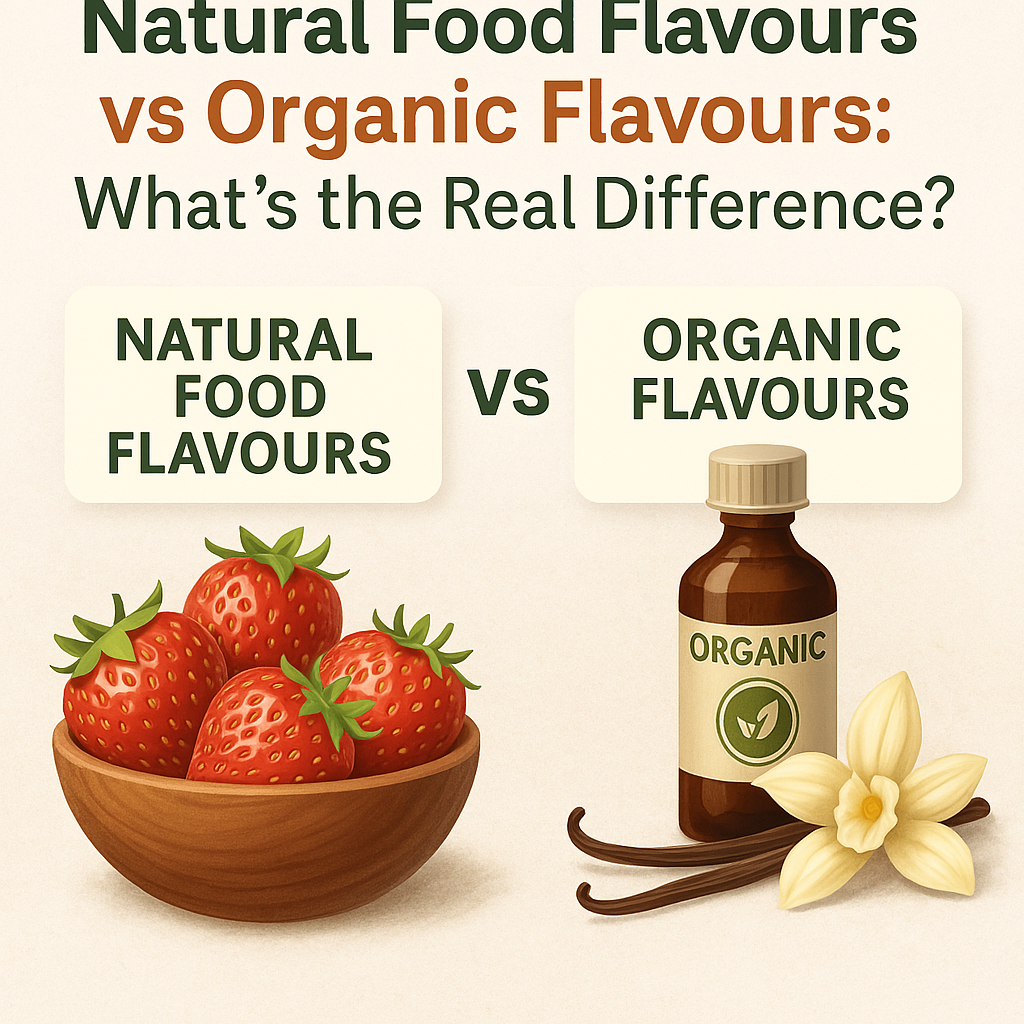Many people, when it comes to their diet and healthcare, naturally lean toward products that highlight natural food flavours on the label. It sounds safer, cleaner, and more wholesome—especially when you’re trying to make better food choices or stick to mindful eating. But when “organic flavours” pop up right next to them, it can throw you off. Aren’t they the same thing? Or is there more to the story?
If food flavours are a big part of your baking essentials, this breakdown is exactly what you need.
What Are Natural Food Flavours?
You probably think the word “natural” on a label means its organic, but this can be quite misleading.
Natural food flavours are derived from real, plant- or animal-based sources. Think vanilla beans, citrus oils, or spices. But here’s the catch: once those ingredients are extracted, they can undergo quite a bit of processing. And still, as long as the original source is “natural,” the flavour gets the label.
So yes, that strawberry flavour might technically come from a real strawberry… but it may have taken a lab detour on the way to your cookie dough.
What matters here is the origin. Natural flavours have to start from something grown or raised, not created from scratch in a chemical lab.
Pros of Natural Flavours:
- More affordable than organic
- Widely available in various food products
- Broader variety of flavour profiles
But keep in mind, just because it says “natural” doesn’t mean it’s minimally processed.
What are Organic Flavours?
Organic flavours go a step further. Not only must they come from natural sources, but those sources also need to be grown without synthetic pesticides, fertilizers, or genetically modified organisms (GMOs).
And the rules are tighter. For a flavour to be labeled “organic,” at least 95% of its ingredients must be certified organic. That means from the soil to the shelf, there’s a trail of regulations ensuring purity.
In short, organic flavours are natural… but not all natural flavours are organic.
Why People Choose Organic:
- Fewer chemicals in the production process
- Environmentally friendly sourcing
- Often considered cleaner and healthier
Organic flavourings tend to be pricier. But if your goal is to keep your baking essentials as clean and sustainable as possible, the cost might be worth it.
Which One Tastes Better?
Some swear by the depth of organic vanilla, saying it gives their cakes a richer, more authentic aroma. Others find natural food flavours more versatile for things like candy-making, where intensity and consistency matter more than purity.
If you’re experimenting in the kitchen, the difference can come down to what you’re making. A delicate shortbread might benefit from the subtlety of organic lemon extract, while a punchy buttercream might shine brighter with a bold natural raspberry flavour.
The best way to know? Try both. Your taste buds will let you know what works.
Which One Should You Use For Baking?
Let’s simplify things.
Go for natural food flavours if:
- You’re looking for variety
- You want more budget-friendly options
- You don’t necessarily need organic certification
Go for organic flavours if:
- You prioritize clean, traceable ingredients
- You bake for people with chemical sensitivities
- You’re aiming for a more eco-conscious kitchen
There’s no wrong answer here. It’s all about what matters most to you and your recipes.
Final Thoughts
At the end of the day, there’s no harm in choosing either of the flavours. Both natural food flavours and organic options bring their own pros and cons to the table. What truly matters is your personal preference, your values, and the kind of experience you want to create—whether that’s a healthier pantry, a better bake, or simply a taste that brings you joy.

